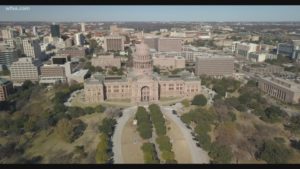AUSTIN (Nexstar) — In the 2021 legislative session, lawmakers expanded the state’s medical cannabis program to include patients with PTSD and all types of cancer as eligible candidates. But since then, advocates say the demand has outgrown the current program’s capabilities.
The state’s medical marijuana program, the Compassionate Use Program (TCUP), operates under the Texas Department of Public Safety. The law currently allows for a minimum of three licensed dispensaries to operate in the state, and so far, there only are three.
Geoff Young with the Veterans Cannabis Project compared this issue to trying to add lanes on MoPac or I-35 when congested traffic is already a daily problem for Texas drivers.
“The existing licensees are lagging behind,” Young said. “The demand is there, the legislation and the laws are already there, we just need more access to what’s been approved.”
During a Thursday DPS Commission meeting last week, Wayne Mueller — chief of DPS’ regulatory services division — said the state is looking to open up applications for more licensees in mid-January. However, he said TCUP likely won’t start making any decisions on any applicants, in case lawmakers make any changes to the program during the 2023 legislative session.
“We didn’t want to unintentionally get in front of the legislature and what they plans they may have as far as any changes to the Compassionate Use Program,” Mueller said. “It would not be our intent to act immediately on those applications since that would put us squarely in the middle of the legislative session,” Mueller said.
Young said this approach is essentially “kicking the can down the road.”
“There are people already waiting weeks, if not months, to get their medication,” he said. “And to say, ‘hey, let’s wait and see what happens’ is a simple dereliction of duty.”
An Air Force veteran himself, Young knows the benefits of medical cannabis firsthand for treating his symptoms of PTSD, anxiety and even mild autism.
“It’s greatly improved my life, even if it’s just sleep or mood day-to-day. Again, it comes down to controlled, educated decisions on using a tool. But when you do use it properly, you can improve your life in many different ways,” he said.
Although Young and other advocates have criticized the state for not having a robust enough medical cannabis program, TCUP has grown significantly since it first started. In order to get prescribed medical marijuana in Texas, prospective patients must go to a state-approved physician who is qualified to prescribe THC to patients through the program.
When TCUP first started, there were eight physicians and four patients in November 2017. Since then, the numbers have increased, with the patients exceeding the number of physicians available to prescribe cannabis.
As of October 2022, there were nearly 39,000 patients in the TCUP registry and 643 physicians.
While the regulatory leaders of the program plan to wait for lawmakers to make the first move, Young said he worries Texans will look elsewhere for cannabis.
“The bottom line is it feeds the black market,” he said. “It just comes down to accepting that it’s already here — whether it’s the Delta-8 market, whether it’s the illicit market — cannabis users are finding a product.”
Whether or not lawmakers will expand TCUP in the upcoming legislative session is unclear. So far, Lt. Gov. Dan Patrick did not list anything related to marijuana in his top priorities. Patrick historically has opposed easing marijuana laws. Gov. Greg Abbott, however, has expressed openness to lowering criminal penalties for small possessions of marijuana.
A recent University of Texas/Texas Politics Project survey found that, asked when marijuana should be legal, 17% said never and 28% said only for medical use. The majority — 55% — said possession of small (32%) or large (23%) amounts of marijuana should be allowed.
H/T: www.ktsm.com



